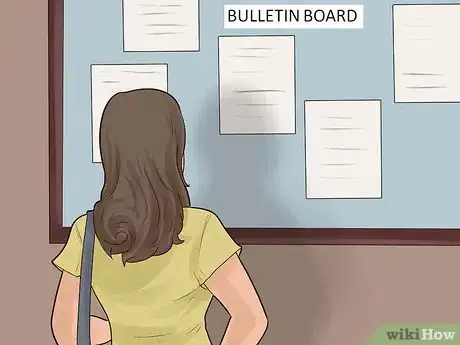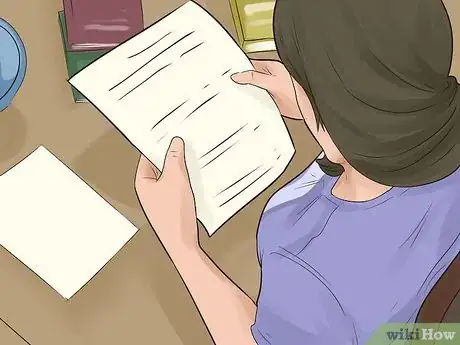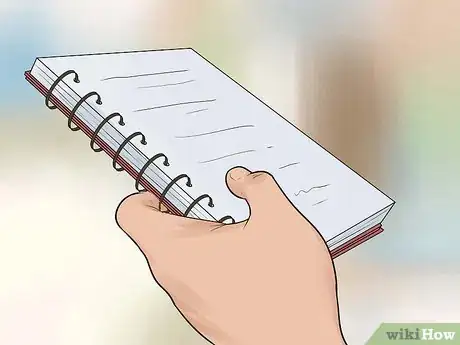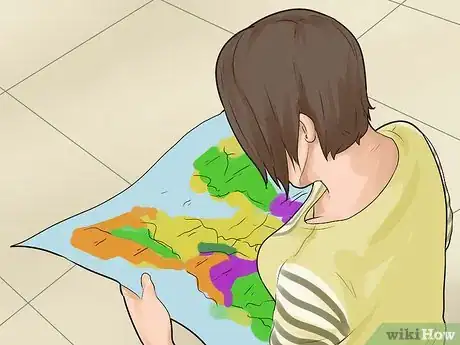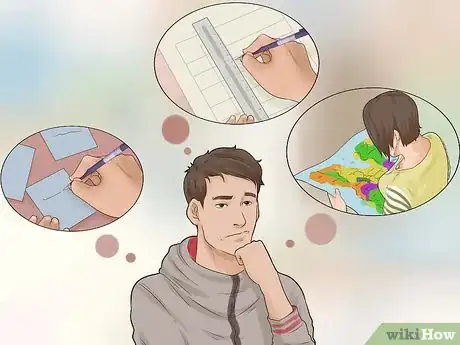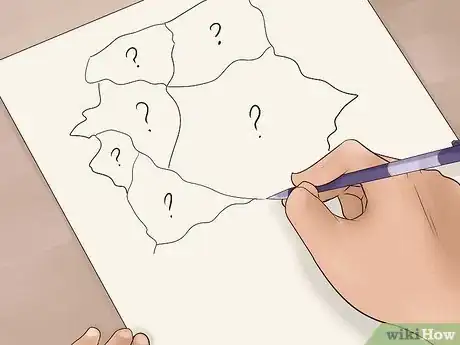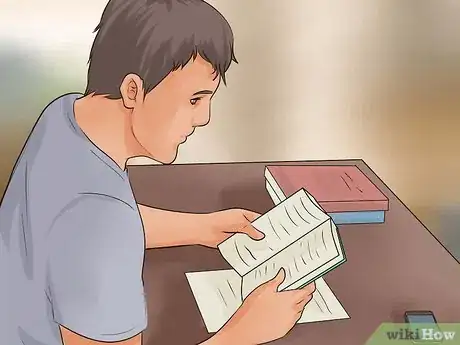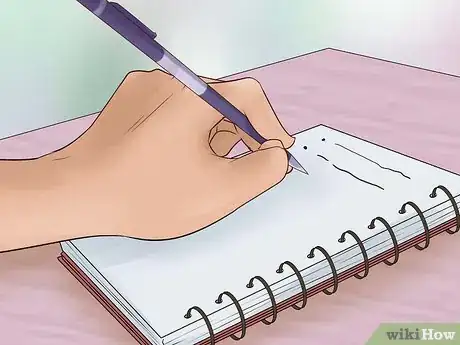This article was co-authored by Josh Jones. Josh Jones is the CEO and Founder of Test Prep Unlimited, a GMAT prep tutoring service. Josh built the world's first and only score guarantee program for private GMAT tutoring. He has presented at the QS World MBA Tour and designed math curricula for Chicago Public Schools. He has over 15 years of private tutoring and classroom teaching experience and a BA in Math from the University of Chicago.
wikiHow marks an article as reader-approved once it receives enough positive feedback. This article received 20 testimonials and 87% of readers who voted found it helpful, earning it our reader-approved status.
This article has been viewed 268,963 times.
Geography exams can be difficult to study for, especially since they require memorization skills. Maps and cities can be tricky to visualize. There are lots of specialist terms that can become confusing and mixed-up in your head, especially if geography isn't your best subject. Lots of techniques for studying for any exam can be useful for geography too. By combining the general principles of good studying, with some specific steps to improve you geographical knowledge and help you remember terms and information, you can give yourself the best chance to get a good grade in your exam.
Steps
Preparing to Study
-
1Find out the time and format of your exam. The first thing to do is get all the information you can about the exam so that you can best prepare. Make sure you know when it is, so you know how long you’ve got, and you can give yourself time to plan your studies. If possible, find out if the exam is based on essay questions, multiple choice questions, a mixture, or something else.
- It’s very helpful to know if you will have to write essay responses in the exam so that you can practice this in your study.
-
2Find out what you will be tested on. Your teacher isn’t going to tell you what questions are going to come up, but be sure you know what you’ll be tested on more generally. Once you know this you can make sure that you have all the notes, maps, and information that were included in your lessons and could come up in the exam. If need be, compare notes with another student to make sure you haven’t missed anything out.Advertisement
-
3Make time in your schedule to study.[1] Before you start it’s helpful to think ahead and set aside time for studying. Clear regular spots in your diary which you can use as time to prepare for your exam. You might find it helpful to study at the same time every evening if you like a very strict routine, but a bit of variety can be useful to break it up so try to keep some flexibility.
- You might find it best to study straight after school while you are still in a working frame of mind, so you can switch off later.
-
4Find a good place to study. It’s good to have a quiet, secluded spot to avoid being distracted or interrupted when you are studying. This could be your bedroom or the library, or somewhere else. It’s a good idea to study somewhere that you have put aside strictly for studying and isn’t somewhere you use for other things like watching TV or eating.[2]
- Make sure it is a comfortable place to sit, and ideally somewhere you can leave your studying materials when you’re not working.
Organising your Studying Schedule
-
1Organise your class notes. Look through all of your geography notes, and try to organise by particular topics and areas so they are easy to read through and in a good order. By doing this you will also be able to easily identify if you have any gaps from missed classes that you need to get notes on. Be sure that you have all the necessary information in order to study before you start.
- If you find that you are missing vital notes, borrow them from a student or ask a teacher for help.
-
2Work out what material you need to cover. Once you have organised your class notes you should have a good outline of how much material you need to revise for the exam. Just reading through your notes will give you a picture of which elements you feel more confident on, and which ones you need to focus more time on. When you have done this you can write a revision checklist.[3]
-
3Identify your priority areas. With your checklist of areas you need to cover, it’s a good idea to go through this and try to prioritise the things which you think will require more studying. Highlight the facts that you already know, and focus on the ones that you don't.[4] Be sure that you thoroughly understand the information in order to remember it better.
-
4Draw up a Study Timetable. Once you have organised what you need to study and seen how much time you have until the exam, you can move on and make your studying schedule. Put in things like school and sports that you know you will be doing at certain times and look to see what time is left. Break up the time you have identified for studying into half-hour slots.[5]
- It’s good to have a brief break after half an hour or twenty minutes so you keep your mind fresh and concentration high.
- Limit the time you spend each night studying. Be sure to set aside space for other projects and assignments, as well as other activities.
-
5Break up your study topics into half-hour chunks. Now you have your study time slots and the checklist of material you want to learn you need to bring the two together. Break the main topics down into what you think you can cover in thirty minutes, and write them into your schedule. Each person will have their own preferences, but you could, for example, try thirty minutes on rivers, thirty on weather, thirty on rocks and geology, and so on.[6]
- If you are uncertain about how to do this you can ask your teacher for some advice.
Studying on your Own
-
1Prepare to study. Before you hit the books, drink a glass of water and eat a light snack to refresh your body. Turn off any electronic devices, and ask your family members for an hour of quiet time. By freeing your mind and surroundings of any distractions, you'll be able to focus on your studying.
-
2Use flashcards to learn key geography terms. Geography has quite a lot of special terminology that it is important to get clear in your head. A good way to learn and remember terms and words is by using flashcards. Write one term onto a small piece of card or paper, with the definition and brief explanation written on the other side. Create these as you go and eventually, you will build up a good library of cards with key terms which you can then revise easily.
- Once you have the cards then pick one at random and try to remember what it means, checking the back if you can’t. Once you have done this a few times you will find you can remember a lot more than before.
- For example, you could write “Oxbow Lake” on a card with an explanation of what this is on the reverse side.
-
3Tackle the maps. Quite often, geography exams require you to fill out locations and identify countries and cities on maps. Although maps can be difficult to study, there are some useful techniques that can help you to study them effectively and remember them.
- Memorize your locations by shapes. For example, Italy can be recognized since it is in the shape of a boot.
- Learn the main cities first before focusing on the surrounding, smaller cities.
- Create acronyms to help you learn the names of locations.
- Listen to the world song by Yakko Warner to help you remember countries.
-
4Try an online practice test.[7] You can test some of your knowledge about geography and maps on certain websites. Lizard Point has a number of quizzes that you can do and track your progress. Try it at the beginning of your studying and then every few days until your exam. This will help you to get a clear picture of your progress while also helping you identify areas that you need to do some more work on.
- Not everything will apply to you and your exam, so use your judgement to decide if it is useful or not.
-
5Apply effective studying methods. If some of the techniques are working for you better than others, then you might want to focus more time on those ones. By finding the ones that work best for you, you can make studying an easier time. But always keep in mind the big picture of what you want to cover in your studying before the exam. If you are good are maps, you might find that more fun, but don’t neglect the areas where you are less strong, even if you do find it more boring.
-
6Take breaks. Be sure to take a five-minute break every twenty minutes so that you don't exhaust yourself. You might think that studying for two hours straight means you’ve done loads of work, but if you lost concentration and were staring into space half the time, then you have wasted time. If you can revise in shorter bursts your studying will be more effective and you will have time to do things that are more fun.
- In these short breaks stand up and move around a bit to release some tension and get your blood moving around more.
- Don’t take really long breaks, you could lose your flow and find it harder to get back to work.
-
7Be wary of listening to music while you study. This can come down to personal preference, but there is research which suggests that listening to music with vocals can lower concentration levels and is best to be avoided when studying.[8] If you find yourself singing along then you’re probably not really focused on your geography.
- Researchers have, however, argued that listening to instrumental music, and in particular Mozart, has a beneficial impact on concentration levels.[9]
Studying with Friends
-
1Create a study date. Every now and then you might like to try studying in a small groups with some of your friends and classmates. This can have advantages and disadvantages, and will depend on how well you work together. Obviously if you end up just talking about other things you are not studying your geography, so you need some discipline.
- This might be easier for some than others, so if you are trying to work and your friend keeps chatting, try to steer them back on topic and then maybe study on your own in the future.
-
2Test each other’s knowledge. One of the big advantages of studying a group is that you can test each other and see where you have gaps. You can do this by using the flashcards you prepared. Pick up a card and read out the term, such as “Igneous rock!” and see who is able to describe and define it more precisely.
- This also works with maps. Draw the outline of a country on a piece of paper and use it as a quiz question. Or say the name of the country and see who can draw it.
- You can test capital cities in this way too.
- You can keep score to make it more fun.
-
3Read each other’s essay answers. If your exam has essay questions, it can be very helpful to do a few practice answers and go through them with a friend. Compare how you have approached the question and analyse which of you has best answered the question. Pick out the strengths and weaknesses of each of your approaches, but remember your friend might not be right.
- You can ask your teacher if they will look at a practice answer.
- You could also ask a parent or older sibling.
-
4Follow a routine. By being faithful and applying yourself to your studies, you'll be able to memorize important facts and do well on the exam. Keep your discipline and stick to your study plan. Remember that you reap what you sow. If you do miss a session, don’t give yourself a really hard-time, but make it up over the next day or two with some extra study.
Reviewing your Studying
-
1Ask someone to test you. By reviewing what you have studied with another person, you'll be able to see how much you know. Ask them to jot down or underline the facts that you aren't familiar with. Also, be open to suggestions from them, as they could come up with good ways to help you memorize facts. It might be helpful to do this with someone who isn’t in your class, like a parent.
-
2Review your notes and flashcards. Go over the information that you have studied, highlighting facts that you know as you go. Be sure that you thoroughly understand the notes. Hopefully you will have a good command of the terms on the flashcards by now. If there are any you still can’t remember, put these aside and spend some extra time just on these.
-
3Review easy facts. Although you might know them well, it may become easy to forget them if you have filled your head with other knowledge. You have most likely concentrated on things you were less certain of, but it’s a good idea to have a look through some of the easier things before the exam. While you should not spend all your time going over information that you know, you should not completely ignore them. You will keep it fresh in your mind this way.
-
4Make a list to guide you. Include the facts that you found easy to study, as well as the ones that you had difficulty with. You can use the list as a reference if you decide to ask a teacher for help. After you have done the exam you can see where you lost marks and whether this matches up with areas you struggled with when you were studying. This experience can help you to study for future geography exams too.
Expert Q&A
Did you know you can get expert answers for this article?
Unlock expert answers by supporting wikiHow
-
QuestionHow should I study for an exam?
 Josh JonesJosh Jones is the CEO and Founder of Test Prep Unlimited, a GMAT prep tutoring service. Josh built the world's first and only score guarantee program for private GMAT tutoring. He has presented at the QS World MBA Tour and designed math curricula for Chicago Public Schools. He has over 15 years of private tutoring and classroom teaching experience and a BA in Math from the University of Chicago.
Josh JonesJosh Jones is the CEO and Founder of Test Prep Unlimited, a GMAT prep tutoring service. Josh built the world's first and only score guarantee program for private GMAT tutoring. He has presented at the QS World MBA Tour and designed math curricula for Chicago Public Schools. He has over 15 years of private tutoring and classroom teaching experience and a BA in Math from the University of Chicago.
CEO, Test Prep Unlimited
-
QuestionHow do I learn geography a day before an exam?
 Community AnswerGeography is detailed so it is not easy to learn geography right before an exam. Study your notes and maps and read your textbook. You can also ask a classmate to highlight major study points for you. Next time, start studying earlier, so it will be a lot easier.
Community AnswerGeography is detailed so it is not easy to learn geography right before an exam. Study your notes and maps and read your textbook. You can also ask a classmate to highlight major study points for you. Next time, start studying earlier, so it will be a lot easier. -
QuestionMy final exam is coming up. What can I do to remember what I read when I study?
 Community AnswerBe sure you understand the concepts you are studying. If you have a full understanding of what you read, it will help you to remember what you've studied.
Community AnswerBe sure you understand the concepts you are studying. If you have a full understanding of what you read, it will help you to remember what you've studied.
Warnings
- Complete harder homework immediately after school as to get it over with. That way, if you feel tired later in the evening, you'll have less to do⧼thumbs_response⧽
- Don't allow studying take over your social life. You can work and still have time for fun. Go out with friends or spend the evening doing an activity that you enjoy.⧼thumbs_response⧽
References
- ↑ Josh Jones. Academic Tutor. Expert Interview. 15 November 2019.
- ↑ https://www.uopeople.edu/blog/find-a-quiet-place-to-study/
- ↑ https://www.nidirect.gov.uk/articles/revision-tips-preparing-exams
- ↑ Josh Jones. Academic Tutor. Expert Interview. 15 November 2019.
- ↑ https://www.nidirect.gov.uk/articles/revision-tips-preparing-exams
- ↑ https://kidshealth.org/en/kids/studying.html
- ↑ Josh Jones. Academic Tutor. Expert Interview. 15 November 2019.
- ↑ https://www.fnu.edu/benefits-studying-music/
- ↑ https://www.uow.edu.au/media/2019/is-it-ok-to-listen-to-music-while-studying.php
About This Article
To study for a geography exam, try using a few different study techniques to help you memorize the maps, terms, and information. Use flashcards to learn key geography terms by writing the term on one side and the definition on the other side of the card. Then, work to remember what the term means without checking the back of the card to help you memorize it. It can also be helpful to memorize countries and locations by their shapes so you can more easily recognize them on a map. When it comes to cities, learn the major cities first and then focus on the smaller cities that surround them. You can also create your own acronyms to help you learn the names of locations. Another helpful strategy is to test your knowledge by taking practice tests online so you can identify what areas you need to focus on. For tips about how to draw up a study timetable, keep reading!
